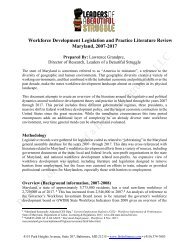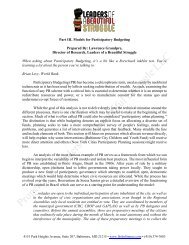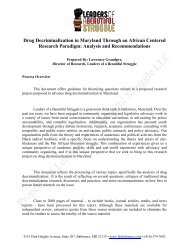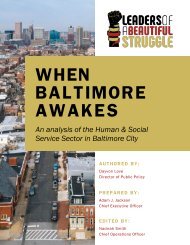The Communal Impacts of Drug Criminalization in Maryland
This project attempts to reframe the harms of drug criminalization. Influenced by African-Centered Research Methodologies, we engaged in a literature review and qualitative research of the communal impacts of drug decriminalization in Maryland, with a specific focus on Baltimore.
This project attempts to reframe the harms of drug criminalization. Influenced by African-Centered Research Methodologies, we engaged in a literature review and qualitative research of the communal impacts of drug decriminalization in Maryland, with a specific focus on Baltimore.
You also want an ePaper? Increase the reach of your titles
YUMPU automatically turns print PDFs into web optimized ePapers that Google loves.
“groupth<strong>in</strong>k”. Also, I realize this fram<strong>in</strong>g has limitations. This analysis, after all, frames<br />
the issue through the lens <strong>of</strong> “cost sav<strong>in</strong>gs,” which can work aga<strong>in</strong>st the notion <strong>of</strong><br />
economic redistribution, and “elite expertise,” which can work aga<strong>in</strong>st notions <strong>of</strong><br />
participatory democracy.<br />
I, Lawrence, a co-author <strong>of</strong> the research report, is a community researcher work<strong>in</strong>g with a<br />
grassroots th<strong>in</strong>k tank which does extensive political advocacy on issues rang<strong>in</strong>g from<br />
police accountability to cannabis legalization from an explicitly Pan African/Black<br />
nationalist lens. This puts me <strong>in</strong> conversation with a broad cross-section <strong>of</strong> “black civil<br />
society,” the community groups which make up so much <strong>of</strong> Black political and civic life <strong>in</strong><br />
a city like Baltimore. Upon be<strong>in</strong>g presented with this standard narrative <strong>of</strong> drug<br />
decrim<strong>in</strong>alization, I was not surprised to f<strong>in</strong>d many <strong>of</strong> those who heard this argument<br />
were generally unenthusiastic or even resistive to drug decrim<strong>in</strong>alization, despite<br />
support<strong>in</strong>g progressive policy and even progressive drug policy <strong>in</strong> the past. <strong>The</strong> comments<br />
presented <strong>in</strong> the “standard narrative” on decrim varied, but mostly diverged from one<br />
central po<strong>in</strong>t; White supremacy and anti-blackness create addiction, street-level drug<br />
sales, survival economics, and the nonpr<strong>of</strong>it <strong>in</strong>dustrial complex, and these operate <strong>in</strong><br />
ways that decrim theorists do not fully understand, turn<strong>in</strong>g the solutions decrim<br />
advocates present, which sound good <strong>in</strong> theory, <strong>in</strong>to <strong>in</strong>effectual or even dangerous <strong>in</strong><br />
reality.<br />
Given that many <strong>of</strong> the civic groups that have been essential to the successful passage <strong>of</strong><br />
progressive legislation <strong>in</strong> the state capital <strong>of</strong> Annapolis <strong>in</strong> the past have been resistant to<br />
this standard narrative <strong>of</strong> decrim, it did not bode well for the political stakes for this<br />
essential issue.<br />
This research project is an attempt to br<strong>in</strong>g these stories to the larger drug policy<br />
community, to create a space for these voices to be heard, as they are <strong>of</strong>ten not sought out<br />
to engage <strong>in</strong> conversation on drug policy, or worse, actively seen as antagonistic to drug<br />
policy reform.<br />
<strong>The</strong> result, we hope, is the beg<strong>in</strong>n<strong>in</strong>g <strong>of</strong> redef<strong>in</strong><strong>in</strong>g how advocates and researchers<br />
understand the harms <strong>of</strong> drug crim<strong>in</strong>alization. Instead <strong>of</strong> a story <strong>of</strong> <strong>in</strong>dividuals be<strong>in</strong>g<br />
harmed by a bad policy, drug crim<strong>in</strong>alization should <strong>in</strong>stead be seen as communities<br />
be<strong>in</strong>g harmed by a system <strong>of</strong> White supremacy that produces anti-Black policy (<strong>of</strong> which<br />
drug crim<strong>in</strong>alization is just one example).<br />
Seen from this perspective, a new frame for drug decrim<strong>in</strong>alization can emerge, one<br />
which places reparation for the War on <strong>Drug</strong>s at its center. This reframed<br />
decrim<strong>in</strong>alization policy is not only more socially just, but it may also be politically<br />
necessary for decrim<strong>in</strong>alization to pass <strong>in</strong> a state like <strong>Maryland</strong>, whose population is over<br />
30 percent African-American and which has one <strong>of</strong> the largest state legislative Black<br />
caucuses <strong>in</strong> the United States (1).<br />
4 <strong>of</strong> 55









